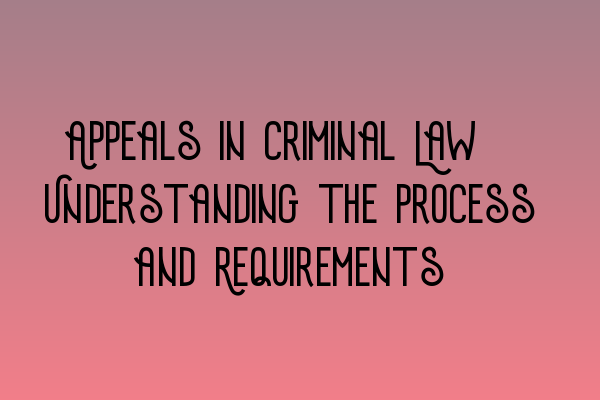Appeals in Criminal Law: Understanding the Process and Requirements
At SQE Criminal Law & Practice Law UK, we believe that every person charged with a criminal offense deserves a fair trial. However, in some instances, the party may feel dissatisfied with the outcome of their case. In such situations, the option of filing an appeal exists.
What is an Appeal?
An appeal is a legal process through which a party seeks to challenge or review the judgment or decision made in their criminal case. It allows individuals to contest errors made during the trial or question the legality of the verdict. Appeals provide a mechanism to ensure fairness and justice in the legal system.
The Appeals Process
The appeals process in criminal law typically involves the following steps:
- Filing a Notice of Appeal: Once a party decides to appeal, they must file a formal notice of appeal with the appropriate court within the designated timeframe. This notice notifies the court and the other party of the intent to challenge the judgment.
- Grounds for Appeal: The party filing the appeal must establish valid grounds for their appeal. Common grounds for appeal include errors in law, procedural irregularities, or new evidence that was not available during the trial.
- Oral Arguments: In some cases, the appellate court may schedule a hearing where both parties present their arguments orally. This allows the appellant’s solicitor to highlight the legal issues and persuade the court to consider their appeal favorably.
- Appeal Decision: After reviewing the appeal documents and hearing oral arguments, the court will make a decision on the appeal. The court may uphold the original decision, reverse it, or remit the case back to the lower court for a retrial.
Requirements for a Successful Appeal
A successful appeal requires careful consideration of various factors. These factors include:
- Grounds for Appeal: As mentioned earlier, having valid grounds for appeal is crucial. It is essential to identify specific errors in law or procedural irregularities that impacted the outcome of the case.
- Evidence: The appellant must gather and present compelling evidence to support their appeal. This may include witness statements, expert opinions, or any other relevant documentation.
- Legal Representation: Seeking professional legal representation is highly recommended for navigating the complexities of the appeals process. A solicitor experienced in criminal law can provide guidance, prepare persuasive arguments, and handle the necessary paperwork.
- Strict Timeframes: Appeals have strict timeframes within which the notice of appeal must be filed. Adhering to these deadlines is critical to ensuring the appeal is not dismissed on technical grounds.
Understanding the process and requirements for appeals in criminal law is paramount when seeking to challenge a conviction or sentence. At SQE Criminal Law & Practice Law UK, we offer SQE 1 preparation courses, SQE 2 preparation courses, as well as invaluable resources such as SQE 1 practice exam questions and SQE 1 practice mocks FLK1 FLK2 to help aspiring solicitors gain the knowledge and skills required to succeed in their legal careers.
If you are looking for information on SRA SQE exam dates or need assistance with appeals in criminal law, our team of experienced solicitors is here to help you navigate through the legal process and maximize your chances of a successful outcome.
